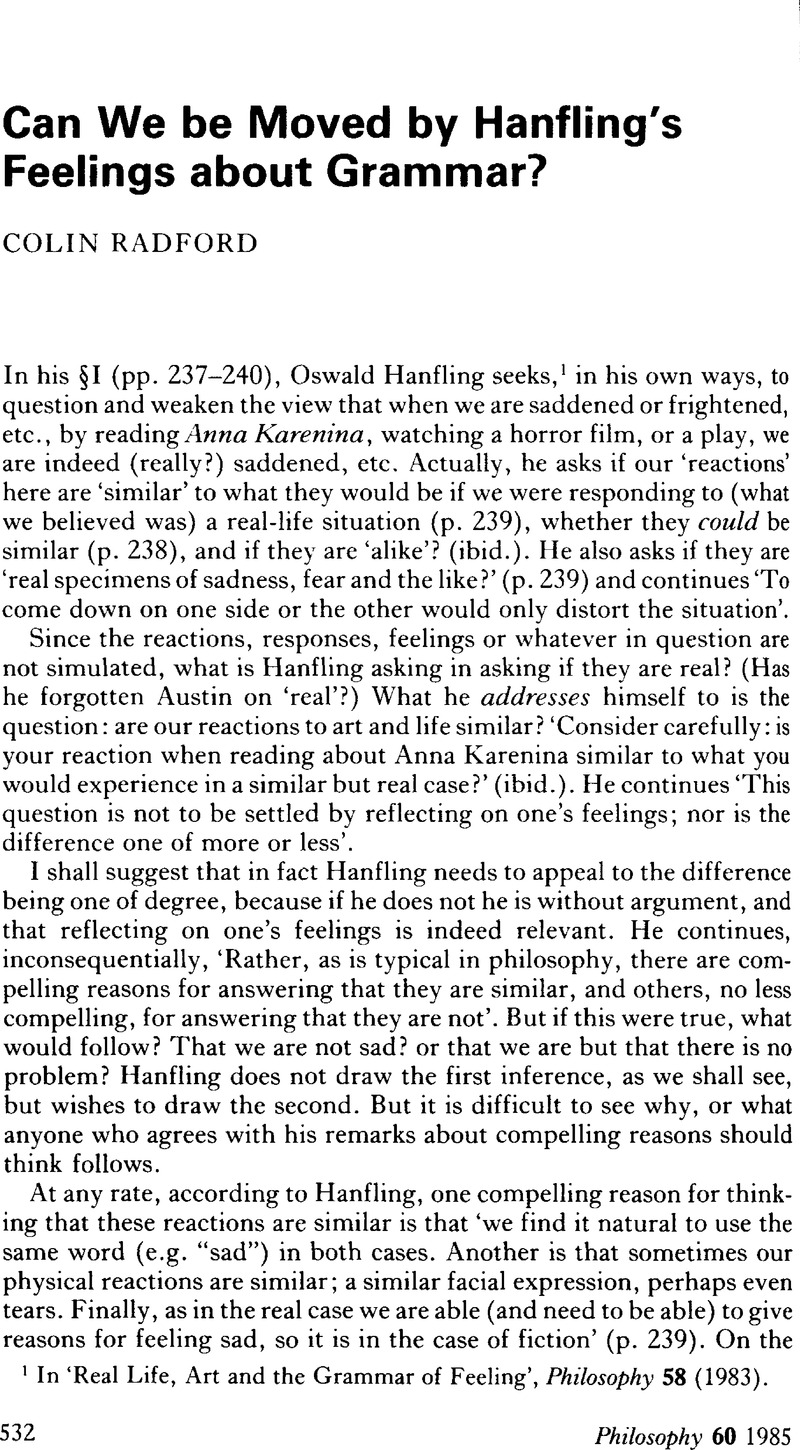Article contents
Can We be Moved by Hanfling's Feelings about Grammar?
Published online by Cambridge University Press: 30 January 2009
Abstract

- Type
- Discussion
- Information
- Copyright
- Copyright © The Royal Institute of Philosophy 1985
References
1 In ‘Real Life, Art and the Grammar of Feeling’, Philosophy 58 (1983).Google Scholar
2 Proceedings of the Aristotelian Society, Supplementary Volume (1975).
3 Is Hanfling's realizing that our sadness is not something we perceive the explanation of why he says that it is irrelevant, in trying to determine if we are indeed saddened by Karenina, Anna, to reflect on our feelings? One would think not because reflecting on one's feelings involves concentrating on them, recalling them, and thinking about them, not perceiving them whatever that could mean. Only those many and mostly empiricist philosophers who conflated thinking and perceiving should make this mistake.Google Scholar
4 If it is logically odd, then masochism is logically odd, as well as psychologically odd and morally odd and abhorrent. But sadism is only psychologically odd and puzzling, and morally odd and abhorrent. So, leaving aside my main thesis, there is nothing logically odd about enjoying the sufferings depicted in fiction and tragedy.Google Scholar
5 When this is not so, we may abandon the workhypenthis was my reaction when I read The RaggedhypenTrousered Philanthropists as a poor student. However, in this case, I am sure that, besides the characters in the story, and the agonies they endured, the object or target, as well as the cause of my gloom, was also and crucially, the real persons and their plights on which the book was based. CF. ‘The Essential Anna’, Philosophy 54 (1979), especially p. 394.Google Scholar
6 It is Hanfling who is too simple about hopes.‘Normally when one has two incompatible hopes, the best solution would be to find a way of satisfying both’.But the best solution is only available when thehopes are only contingently incompatible, and the contingency can, we think, be altered. Wanting and hoping to go on smoking, but wanting and hoping not to suffer lung damage, I smoke less, smoke lowerhypentar cigarettes, and hopeexcl But I cannot coherently hope that Mercutio will die and that he will not die or try to find a way of satisfying both hopes. Because this involves not only wanting both p and nothypenp, which is intelligible (but hopelessexcl) but also involves believing that p and that nothypenp. (See my ‘Hoping and Wishing’, Aristotelian Society Proceedings, Supplementary Volume, XLIV (1970).) Now I can do this, but I can only do it if I am not aware that I am doing it. But, even if I am thus confused, there is nothing I can try to do to bring it about that p and that nothypenp. So if I do hope that Mercutio will not die, and that he will, there is no solution, ‘best’ or otherwise, and Hanfling therefore has no argument for saying that I do not hope thishypenthough in my view, of course, I cannot coherently do soexcl.Google Scholar
7 Cf. ‘Tears and Fiction’, Philosophy 52 (1977).Google Scholar
8 Mounce, H. O., Art and Real Life, Philosophy 55 (1980).Google Scholar
- 1
- Cited by




